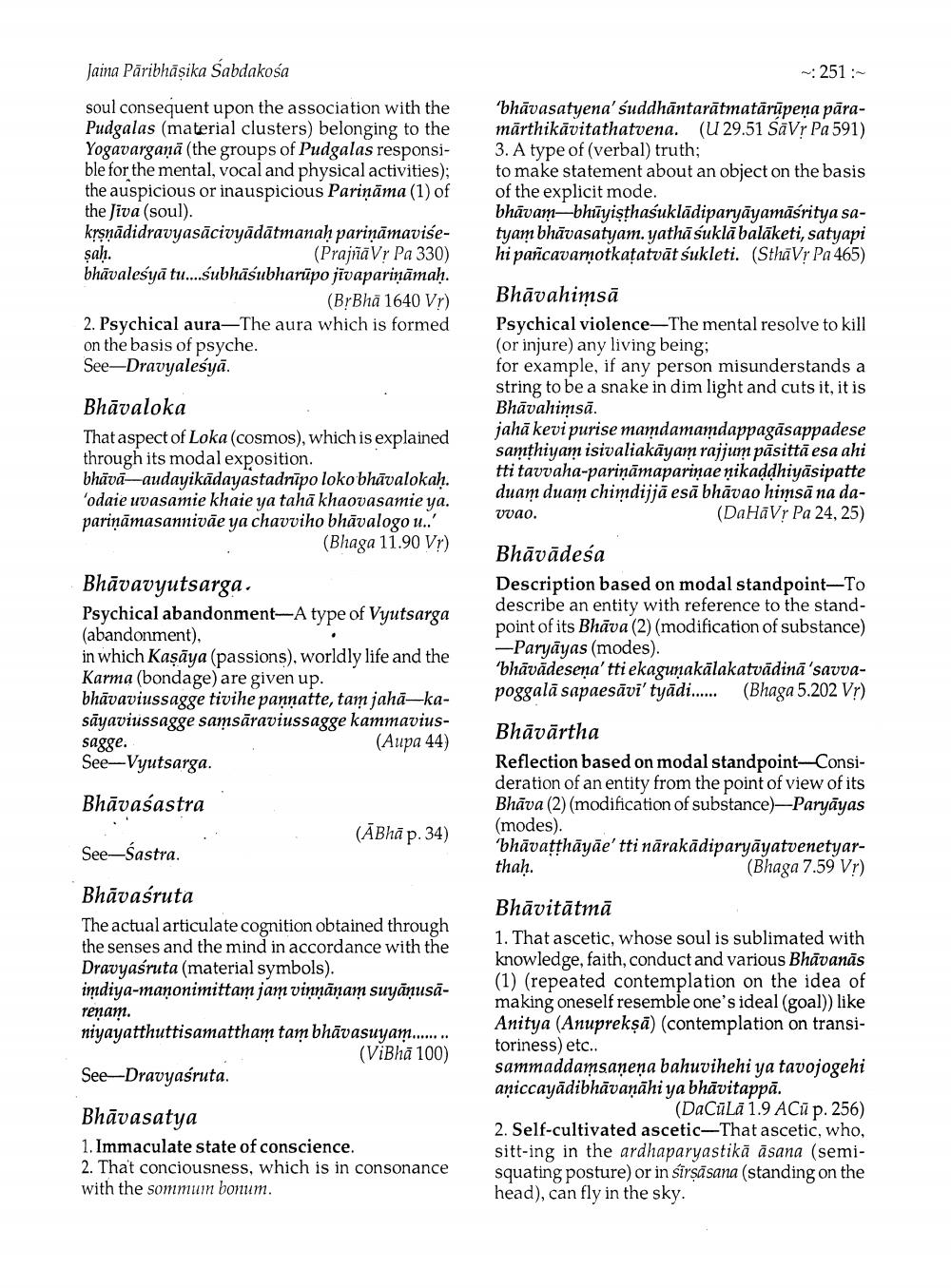________________
- 251 :
Jaina Pāribhāṣika Sabdakosa soul consequent upon the association with the Pudgalas (material clusters) belonging to the Yogavargaņā (the groups of Pudgalas responsible for the mental, vocal and physical activities); the auspicious or inauspicious Pariņāma (1) of the Jiva (soul). krsnādidravyasācivyādātmanah pariņāmavise
(PrajnaVr Pa 330) bhāvalesyā tu....śubhāśubharūpo jīvapariņāmaḥ.
(BrBhā 1640 Vr) 2. Psychical aura-The aura which is formed on the basis of psyche. See-Dravyaleśyā.
'bhāvasatyena' suddhāntarātmatārupeņa pāramārthikāvitathatvena. (U 29.51 SāVr Pa 591) 3. A type of (verbal) truth; to make statement about an object on the basis of the explicit mode. bhāvam-bhūyiṣthasuklādiparyāyamāsritya satyam bhāvasatyam. yathā suklā balāketi, satyapi hi pañcavarņotkațatvāt sukleti. (SthāVr Pa 465)
şah.
Bhāvaloka That aspect of Loka (cosmos), which is explained through its modal exposition. bhāvā-audayikādayastadrāpo loko bhāvalokah. odaie uvasamie khaie ya taha khaovasamie ya. pariņāmasannivāe ya chavviho bhāvalogou..'
(Bhaga 11.90 Vr)
Bhāvahimsā Psychical violence—The mental resolve to kill (or injure) any living being; for example, if any person misunderstands a string to be a snake in dim light and cuts it, it is Bhāvahimsā. jahā kevi purise mamdamamdappagāsappadese samthiyam isivaliakāyam rajjumpāsittā esa ahi tti tavvaha-pariņāmapariņae nikaddhiyāsipatte duam duam chimdijjā esābhāvao himsa na davvao.
(DaHāV? Pa 24, 25)
Bhāvavyutsarga. Psychical abandonment-A type of Vyutsarga (abandonment), in which Kaşāya (passions), worldly life and the Karma (bondage) are given up. bhāvaviussagge tivihe pannatte, tam jaha-kasāyaviussagge samsāraviussagge kammaviussagge.
(Aupa 44) See-Vyutsarga.
Bhāvādesa Description based on modal standpoint-To describe an entity with reference to the standpoint of its Bhāva (2) (modification of substance) -Paryāyas (modes). 'bhāvādesena' tti ekagunakälakatvādinā 'savvapoggalā sapaesāvi' tyādi...... (Bhaga 5.202 Vr)
Bhāvasastra
Bhāvārtha Reflection based on modal standpoint Consideration of an entity from the point of view of its Bhāva (2) (modification of substance)- Paryāyas (modes). 'bhāvaţthāyāe' tti nārakādiparyāyatvenetyarthaḥ.
(Bhaga 7.59 Vr)
(ĀBhā p. 34)
See-Sastra.
Bhāvasruta The actual articulate cognition obtained through the senses and the mind in accordance with the Dravyasruta (material symbols). imdiya-maņonimittam jam vinnānam suyānusarenam. niyayatthuttisamattham tam bhāvasuyam........
(ViBhā 100 See-Dravyasruta.
Bhāvitātmā 1. That ascetic, whose soul is sublimated with knowledge, faith, conduct and various Bhāvanās (1) (repeated contemplation on the idea of making oneself resemble one's ideal (goal)) like Anitya (Anuprekşā) (contemplation on transitoriness) etc.. sammaddamsaņeņa bahuvihehi ya tavojogehi anicca1,ũdibhāoan@hi va bhāoitappõ.
(DaCūLā 1.9 ACū p. 256) 2. Self-cultivated ascetic-That ascetic, who, sitt-ing in the ardhaparyastikā āsana (semisquating posture) or in sirşāsana (standing on the head), can fly in the sky.
Bhāvasatya 1. Immaculate state of conscience. 2. That conciousness, which is in consonance with the sommuin bonum.




